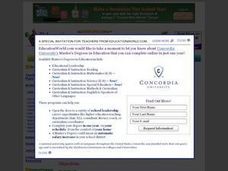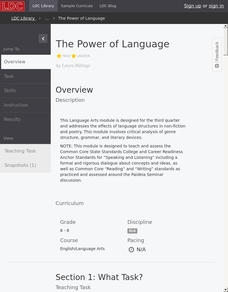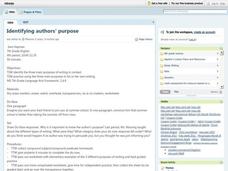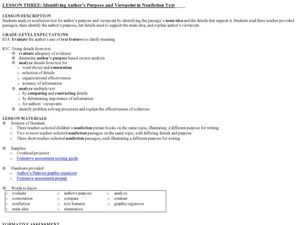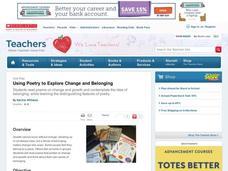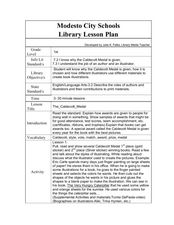New York State Education Department
English Language Arts Examination: June 2014
Should companies track consumers' shopping preferences without their permission? Using the resource, scholars write source-based argumentative essays to answer the question. They also answer reading comprehension questions based on an...
Curated OER
Poetry Shopping Spree
Scholars demonstrate the ability to evaluate authors' use of literary elements such as metaphor, simile, personification, imagery, and onomatopoeia. They are provided with a checklist and must shop for poems that contain the poetry terms...
Curated OER
Figurative Language
What is figurative language, and why do we use it? Introduce your high schoolers to some examples and discuss the importance of including this element in your writing. After studying a text and searching for examples, writers will...
EngageNY
Reading for Gist, Answering Text-Dependent Questions, and Determining Author’s Purpose: Industrial Organic Food Chain
After re-reading The Omnivore’s Dilemma using a Reading Closely: Guiding Questions handout, class members use sticky notes to annotate and determine the gist of the text. Finally, they use an Author’s Purpose graphic organizer to...
Curated OER
Lesson 3: Distinguishing the Author's Purpose
It is true that the more you practice something, the better you'll get at doing it. Lesson three in a three part series on author's purpose has kids venture out to determine the author's purpose in three different passages. They'll read...
Poetry4kids
Evoking the Senses in a Poem
Budding poets choose a topic for a sensory-filled poem. Authors describe that topic using detailed language based on the five senses. Then, switch the senses to create a fanciful poem intended to add a touch of fun to the objective.
PBS
Their Eyes Were Watching God: The Impact of Language
Author, filmmaker, and anthropologist Zora Neale Hurston was also a dialectologist. The dialogue of the characters in her novel Their Eyes Were Watching God reveals her fascination with accents and dialects. A short video from the Great...
EngageNY
Reading for Gist, Answering Text-Dependent Questions, and Determining Author’s Purpose: Industrial Food Chain
A Reading Closely: Guiding Questions handout leads readers to discover the gist of The Omnivore’s Dilemma. While reading, pupils look closely at the words in the text and discuss their meaning. They use dictionaries when needed to answer...
College Board
2002 AP® English Language and Composition Free-Response Questions
It is not what you say but how you say it. Scholars use an essay prompt from the 2002 AP® English Language and Composition Free-Response Questions to analyze how an author uses language to describe her past. They also support or argue a...
Literacy Design Collaborative
The Power of Language
There is power in words. Readers take a close look at three text to determine how language structures affect meaning, including include poems and recipes. Scholars analyze the language authors use by circling important words, underlining...
Read Works
The Language of Setting
Examine the connection between descriptive language and emotional impact. For the first few chapters of The Lion, the Witch and the Wardrobe by C.S. Lewis, learners record the descriptive writing the author used to vivify the woods in...
EngageNY
Using Effective Search Terms: Researching Screen Time
The proof is in the reading. Scholars read an article, "Attached to Technology and Paying the Price," and answer text-dependent questions. Next, they complete a Venn diagram to contrast two authors' use of evidence on the topic of screen...
Curated OER
Identifying author's purpose
Why is it important to know an author's purpose? After reviewing the three main purposes of writing, seventh graders write a persuasive letter to convince why summer school is better than taking the summer off. They can then join in a...
Teach-nology
Author's Purpose
Challenge your class to find the three purposes for writing. After they read three short passages, kids note whether the author's purpose was to inform, persuade, or entertain.
Curated OER
Identify and Discuss the Author's Purpose
Examine author's purpose in a persuasive text using this scaffolded plan. You essentially have a verbatim script here, but it can definitely be used as an outline instead. Review questions that readers should ask themselves when...
Teach-nology
Author’s Purpose
What is the author's purpose when writing a narrative story? Kids read a short narrative passage before answering three questions about author's purpose.
Curated OER
Who's Your Favorite Author?
Imagine a kindergarten author study. Did you know that Angela Johnson writes about families while Eric Carle writes about insects and animals? In small groups, the class examines a basket of books sorted by author and records...
Curated OER
Identifying Author’s Purpose and Viewpoint in Nonfiction Text
Why do people write books? Pupils discover how to identify the author's viewpoint. They read non-fiction passages their instructor selects (the plan has the class look at nonfiction children's picture books), and then identify the...
Curated OER
Using Details from Text to Identify Author's Purpose
Explore writing techniques by analyzing newspapers and magazines with middle schoolers. They will collaborate in small groups to read local news stories and identify the main ideas and author's intent. They also utilize an information...
Curated OER
Author's Purpose
How do you determine an author’s purpose? You ask the author, of course. Invite a local journalist into the class to respond to scripted student questions about his/her writing process. A review of basic classroom etiquette is also...
Curated OER
Using Words as a Way into Rick Riordan's The Lightning Thief
Use the Visual Thesaurus to predict the subject matter of Rick Riordan's book The Lightning Thief. A pre-reading activity encourages middle schoolers to use context clues and word meaning to discover what the book is about. After they...
Scholastic
Using Poetry to Explore Change and Belonging
Change, growth, and a sense of belonging are the focus of a unit that uses poetry to explore these themes and the distinguishing features of poetry as well.
Curated OER
Formal versus Informal Language
Engage in an activity that focuses on the concepts of formal and informal language use. Middle and high schoolers compare and contrast each style by using a Venn diagram that includes some examples. They read and hear a passage of lyrics...
Curated OER
Authors and Illustrators: What do they do?
Help readers understand the roles of authors and illustrators and why they have been recognized by medals of excellence. Your class will discuss and then create illustrations for a book. When they have finished, you can hold your own...



